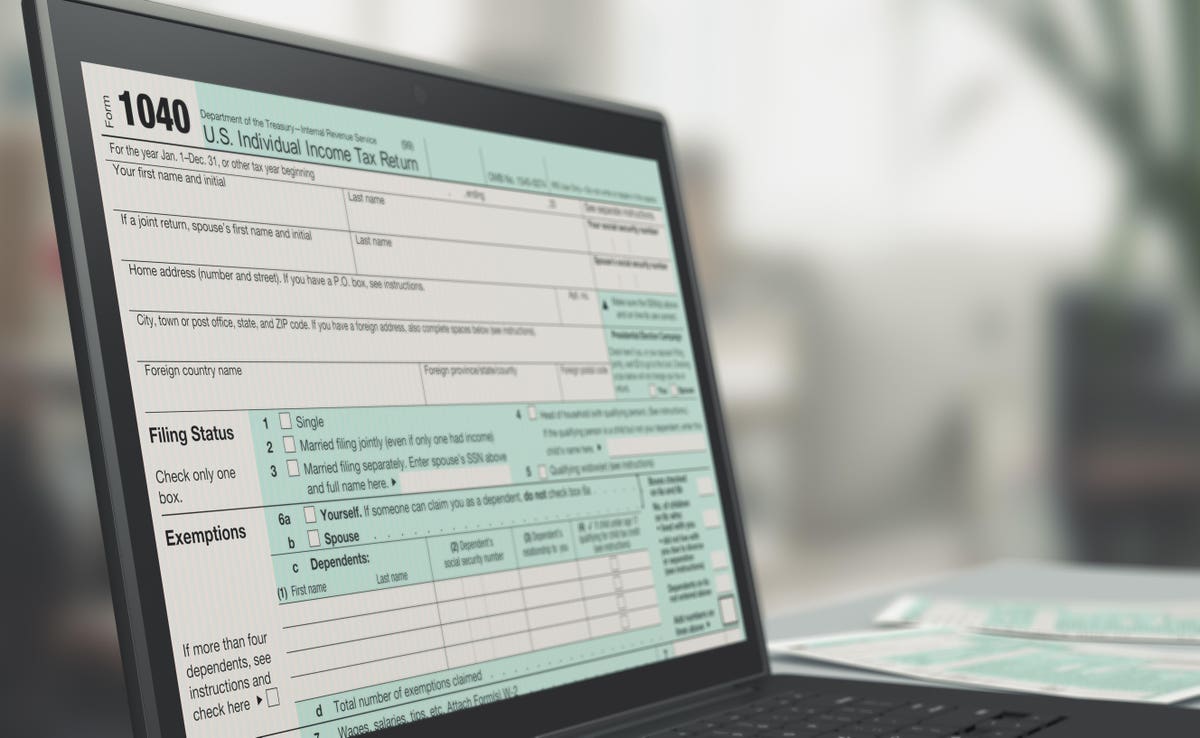closeup of a pc laptop computer with a tax kind on display, idea of on-line tax submitting (3d render)
Google, Meta, and a number of other tax prep corporations, together with H&R Block and TaxAct, are fielding an escalating variety of U.S. lawsuits alleging that they allowed monitoring pixels to unlawfully gather taxpayers’ confidential data as they filed their federal earnings tax returns on-line.
The claims, which have been first reported in November 2022 by investigative information outlet The Markup, have raised issues about potential frequent legislation privateness violations, federal wiretapping violations, and violations of the IRC.
The IRC requires federal earnings tax returns and tax return data to stay confidential below part 6103(a), until an exception applies. There’s a third-party exception (part 6103(c)) that obligates third events that obtain return data to make use of it solely because the taxpayer authorizes.
“Individuals designated by the taxpayer below this subsection to obtain return data shall not use the knowledge for any objective apart from the categorical objective for which consent was granted and shall not disclose return data to another individual with out the categorical permission of, or request by, the taxpayer,” the statute says.
There are questions on whether or not the knowledge allegedly captured by Google and Meta may violate the IRC’s legal disclosure statute, part 7216, and whether or not taxpayers can search civil damages below part 7431(a)(2).
Former Nationwide Taxpayer Advocate Nina Olson extensively mentioned that query after the story broke and stated that taxpayers could be hamstrung by necessary arbitration clauses positioned within the prep corporations’ phrases of use.
The claims have additionally caught the eye of a gaggle of Democratic lawmakers, who investigated the businesses and at the moment are calling on the IRS to develop a free, direct e-file system wherein taxpayers can bypass third-party tax return prep corporations and straight file their returns with the IRS.
Doing so would convey america into alignment with its worldwide friends, however it will require vital modifications to the company’s customer support and on-line service capabilities.
Pixel Litigation
For the reason that story in The Markup was printed, there have been a number of lawsuits filed across the nation. A current submitting towards Google sheds some gentle on the sorts of claims that plaintiffs are pursuing.
Google is going through a proposed class motion lawsuit alleging violations of taxpayers’ privateness when the corporate collected delicate monetary knowledge by way of monitoring pixels embedded on the web sites of main tax return prep corporations like H&R Block, TaxAct, and TaxSlayer (Smith v. Google, 5:23-cv-03527 (N.D. Cal.)).
Seattle, USA – Aug 19, 2019: The brand new Google constructing within the south lake union space at twilight.
As prospects accomplished their tax returns, the pixels allegedly collected the return knowledge — together with earnings, refund quantities, submitting standing, and scholarship data — and transmitted it to Google. The tech big then used the knowledge with out shoppers’ consent in an effort to enhance its advert enterprise, violating customers’ privateness and state and federal wiretapping legal guidelines, in accordance with the lawsuit.
The proposed class motion swimsuit was filed in California federal district court docket by a girl who used H&R Block’s web site to file her tax return on-line. The monitoring pixel on the coronary heart of the criticism is a enterprise instrument that belongs to Google Analytics. The corporate collects knowledge from web sites and apps and aggregates the knowledge into stories for enterprise homeowners to achieve a greater understanding of how customers work together with the companies’ on-line platforms.
The pixel is an invisible bug added to the code of a web site’s web page. It collects pseudonymous details about customers’ interplay with that web page. Web site homeowners can customise what sorts of knowledge the pixel collects.
As the information is collected, it’s transmitted in actual time to Google. The pixel is a default a part of Google Analytics, the criticism costs, and the information can’t be modified after it’s processed and saved in a report, the lawsuit notes.
TaxAct and TaxSlayer allegedly routinely despatched the greenback quantities of taxpayers’ adjusted gross earnings and tax refunds to Google, in accordance with the criticism. The pixels could have additionally collected customers’ e-mail addresses, submitting standing, details about the buttons that they clicked, and the yr of their return. In response to the lawsuit, taxpayers had no method of figuring out this was taking place.
“Google firm officers have admitted that if a Google Analytics buyer so desired, they’d have the ability to configure their settings to trace delicate taxpayer data akin to adjusted gross earnings, and Google’s methods wouldn’t filter this data and even alert anybody,” the criticism says.
Google says it has a number of safeguards to make sure anonymity. Knowledge collected by pixels shouldn’t be collected together with identifiable data like usernames so it could’t be tracked to a particular person. Google Analytics prospects are additionally prohibited from sending Google data that would later be used to determine people. Companies that violate the coverage could have their accounts suspended or terminated, in accordance with Google.
However the plaintiff alleges that the knowledge could not have been as pseudonymous as Google says, citing a research saying that Google’s monitoring software program can de-anonymize knowledge by data collected on a person’s internet shopping historical past.
Both method, the plaintiff says Google by no means contacted H&R Block, TaxAct, or TaxSlayer about whether or not they have been sharing customers’ monetary data.
“Google would have identified, or at finest recklessly turned a blind eye, to the truth that it was accumulating huge quantities of confidential tax data. Earnings and different associated monetary data are extremely precious demographic markers for promoting functions,” the criticism says.
The lawsuit alleges that Google violated a number of provisions of the California Invasion of Privateness Act in addition to the Federal Wiretap Act. “Disclosing tax-return data with out consent is against the law (26 U.S. sec. 7216). Aiding and abetting the illegal disclosure of tax-return data is against the law. Inspecting unlawfully obtained tax-return data is against the law (26 U.S. sec. 7213A(a)(2)),” the criticism says.
Democratic Lawmakers Examine
A bunch of Democratic lawmakers sees an answer for this knowledge privateness downside: They need the IRS to undertake a direct-file system.
After launch of the story in The Markup, seven lawmakers, together with Senate Finance Committee member Elizabeth Warren, D-Mass., and committee Chair Ron Wyden, D-Ore., launched a congressional probe into the pixel connection between Meta and main tax return prep corporations.
WASHINGTON, DC – DECEMBER 14: Sen. Elizabeth Warren (D-MA) and Sen. Ron Wyden (D-OR) depart the … [+]
In that investigation, they requested H&R Block, TaxAct, TaxSlayer, Intuit, Meta, and Google to clarify how they gather, disclose, and use taxpayer knowledge.
TaxAct informed lawmakers that the Meta pixel collected knowledge from each its paid customers and IRS Free File customers. That knowledge included “customers’ full title, e-mail handle, nation of residence, state, metropolis, zip code, cellphone quantity, gender, date of delivery, first names of dependents, buttons that have been clicked, names of text-entry kinds that the taxpayer navigated to (each of which may point out, for instance, whether or not taxpayers have been eligible for deductions or exemptions), internet browser used, yr of the return, and web site referrals” the report stated. Meta additional acquired knowledge about “taxpayers’ variety of dependents, variety of W-2 Types, AGI (rounded to the closest thousand), federal tax owed, and refund quantity (each rounded to the closest hundred),” in accordance with the report.
TaxAct additionally informed lawmakers {that a} totally different Meta enterprise instrument collected indicators flagging gadgets akin to whether or not a taxpayer was the pinnacle of family or married submitting collectively, or had funding earnings, charitable contributions, mortgage curiosity, customary deductions, and scholar mortgage curiosity.
H&R Block shared with lawmakers that Meta acquired further data, together with taxpayers’ first names and mixture quantities involving HSA contributions, scholarships, and training bills. Google’s pixel shared details about whether or not taxpayers visited webpages addressing matters akin to dependents, sorts of earnings like capital positive aspects, and tax credit or deductions, the report stated.
TaxSlayer informed lawmakers:
“the Meta Pixel could have tried to gather title, e-mail, cellphone quantity, metropolis, state, and zip code on sure pages. To the very best of the corporate’s information, the Meta pixel didn’t, nevertheless, gather gender, nation, date of delivery, social safety numbers, earnings, adjusted gross earnings, deductions, refunds owed, taxes owed, well being financial savings data, Kind 1040 or different tax kinds, or different delicate data from tax returns.”
Nonetheless, the Meta pixel did share details about the webpages that TaxSlayer customers visited. The lawmakers say that finally would have transmitted delicate knowledge together with taxpayers’ reporting rental earnings and alimony.
TaxSlayer, which additionally makes use of the Google pixel, informed lawmakers: “To the very best of the corporate’s information, the Google Analytics pixel doesn’t gather title, handle, submitting standing, details about dependents, earnings, belongings, refunds owed, taxes owed, social safety quantity, well being financial savings data, Kind 1040 or different tax kinds, or another delicate data from tax returns.”
Intuit informed lawmakers it shared solely its customers’ usernames with Meta.
In a withering assertion, lawmakers stated the investigation confirmed that taxpayers want alternate options to personal tax return prep corporations. In 2022 over 93% of particular person tax returns have been filed electronically, in accordance with the IRS. Taxpayers largely filed these returns by way of main prep corporations, in accordance with the report.
“This investigation raises critical doubts in regards to the capacity of the tax prep trade to safeguard taxpayer data and highlights the pressing want for the IRS to develop its personal on-line tax submitting system — to guard taxpayer privateness and supply a greater various for taxpayers to file their returns,” the report says.
The IRS is already contemplating this path. In 2024 it would launch a direct e-file pilot program, a growth the group of lawmakers stated they welcome.
IRS Direct E-File
A free IRS direct e-filing tax return system has lengthy been on the minds of some lawmakers. When the Biden administration allotted $80 billion in funding to the IRS within the Inflation Discount Act, it directed the company to review the potential for a direct e-file system and report on its potential value, challenges, and taxpayer urge for food for it.
The report depends on two small taxpayer surveys. In a single, the IRS surveyed a small pattern dimension of about 4,000 taxpayers on the problem throughout its 2022 annual taxpayer expertise survey. The second survey, performed by the Mitre Corp., surveyed 2,000 people.
A predominant discovering from the report is that there’s some taxpayer assist for a direct-file system that will allow customers to straight put together and file their tax returns with the federal authorities. Within the taxpayer expertise survey, 28% of respondents informed the IRS they have been very keen on a direct-file system, and 45% stated they have been considerably .
1040 earnings tax kind and w-2 wage assertion with a federal Treasury refund test. Closeup with … [+]
Based mostly on the surveys, the IRS discovered that taxpayers who’re youthful, already self-prepare their tax returns, or have restricted English proficiency usually tend to be keen on direct submitting. Value is a significant factor for taxpayers — many taxpayers who informed the IRS they weren’t keen on a direct-file choice revealed that they already file their returns without spending a dime.
Privateness is one other issue. The IRS survey confirmed that some taxpayers are cautious of a possible direct-file program and the way it may very well be used for tax enforcement. Nonetheless, some taxpayers informed the IRS that the company’s involvement in constructing a direct-file system can be a horny promoting level.
If the IRS creates a direct-file system, it might want to allocate a major quantity of assets to customer support and assist. Nonetheless, it has struggled to extend its customer support personnel for a few years.
The Service estimates {that a} direct-file system may value the federal government $64 million yearly on the low vary, if it solely coated 5 million customers and a slim band of tax conditions. On the higher certain, direct file may value $249 million yearly if it utilized to 25 million taxpayers and a big selection of tax eventualities.
In each circumstances, a minimum of half or extra of the price would go to buyer assist. If the IRS supported 25 million customers, about 84% of its annual prices can be eaten by buyer assist wants.
A direct-file system would additionally push the IRS into new tech and knowledge privateness territory. “Whereas the IRS has expertise creating profitable new merchandise akin to Modernized e-File, Direct File would current new challenges together with complexity of constructing configuration-driven software program, updating the instrument to maintain tempo with tax legislation modifications, and guaranteeing taxpayer data is stored personal and safe,” the report stated.
Lastly, there are questions on whether or not and the way the IRS would harmonize a direct e-filing system with the submitting of state earnings tax returns. Taxpayers are accustomed to submitting their federal and state earnings tax returns on the identical place, and an IRS direct-file system would ideally permit for that.
The Overseas Expertise
The IRS stated it’s contemplating the experiences of overseas tax companies that permit their taxpayers to file tax returns without spending a dime, or that even provide free tax return preparation providers.
If the IRS have been to create a direct-filing system, that will convey the nation up to the mark with its friends world wide, lots of which — together with the UK, Australia, Japan, Spain, and France — permit taxpayers to straight file their tax returns on-line, in accordance with OECD knowledge.
The following step can be offering return prepopulated methods — some 83% of superior and rising economies pre-fill a minimum of a part of taxpayers’ tax returns with data reported by third events, in accordance with the IRS.
The report famous that Australia, Belgium, Denmark, Spain, Sweden, France, Finland, and Norway all do that. The IRS notes {that a} potential direct-file system can be extra enticing to taxpayers if it included some prepopulated knowledge. Over 30 nations, together with Germany, the UK, and Japan, keep a return-free tax system, wherein the tax administration prepares taxpayers’ returns, in accordance with analysis from the City-Brookings Tax Coverage Middle.
A return-free system is exterior the scope of the IRS’s plans or analysis — it was not requested to look right into a return-free system, however that will be the ultimate step in this sort of tax administration service.
Different authorities companies have additionally appeared overseas to see what’s doable. In December 2019 the Authorities Accountability Workplace evaluated the IRS’s on-line providers and in contrast the U.S. system with that of Australia, New Zealand, and the UK, as a result of they keep on-line providers that the IRS didn’t have on the time of publication.
These three nations permit taxpayers to straight file their tax returns on-line. The GAO in contrast and contrasted parts of their tax administration methods with these of america to see whether or not on-line direct submitting could be doable with the IRS.
A number of the largest variations concerned communication capabilities — on the time, the GAO famous that the overseas nations had digital chat capabilities that the IRS didn’t have and in some circumstances (like New Zealand) allowed taxpayers to straight add requested tax paperwork to the tax administration web site.
The three nations additionally permit taxpayers to create a single on-line account to navigate all tax and income providers, which the IRS didn’t have on the time.
Nonetheless, the IRS has superior its capabilities since then. On the time of the GAO’s report, taxpayers may entry a “View Your Account Info” web page on the IRS web site and entry hyperlinks to different on-line providers there. The IRS has since modified that right into a “Your On-line Account” web page the place particular person taxpayers can entry a few of their tax information, make funds, and consider their present stability.
However taxpayers can not conduct all their tax enterprise there, not like within the three nations the GAO surveyed. Between 2021 and 2022, the IRS additionally launched voice and chat bots to assist taxpayers with easy fee and assortment points. In June of that yr, it expanded its voice bot capabilities to assist taxpayers modify fee plans or confirm their id.
Whereas the IRS is evolving and can proceed to evolve due to the Inflation Discount Act, it nonetheless has an extended option to go, significantly in contrast with different nations. The place the federal government sees risk, others see overly formidable plans and consider that the U.S. system shouldn’t be but prepared for direct file.
The Tax Basis has stated {that a} direct-file system is feasible in different nations as a result of their tax codes are much less complicated than that of america, which raises a separate dialogue in regards to the design and intent of the U.S. tax code.
Within the meantime, the unfolding litigation and congressional investigation shine a highlight on an vital taxpayer situation that america may resolve by taking a couple of cues from its overseas counterparts.









